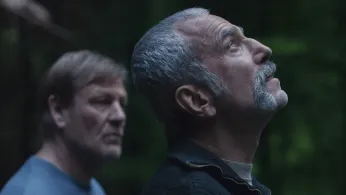
4 hours ago
Bleak Family Drama 'Anemone' Brings the Great Daniel Day-Lewis Back in From the Cold
Jocelyn Noveck READ TIME: 3 MIN.
It is often said of our greatest actors that they could compellingly recite the phone book.
There's no doubt, just to continue that thought for a moment, that Daniel Day-Lewis is one of our greatest living actors — perhaps truly the best of them all. And so the first and most important thing to say about “Anemone,” a bleak, somber, absorbing but also sometimes frustratingly opaque collaboration with his director son Ronan, is that it's brought Day-Lewis back. He told us eight years ago that he was done with acting, and we hoped he was exaggerating. At least for now, it seems he was.
As for the phone book: Well, there’s a moment here where you might wish that was indeed the content you were hearing. In one of two remarkable monologues that punctuate a movie otherwise spare with words, Day-Lewis, playing a bitter and lonely recluse, lets loose an anecdote so shockingly scatological and epically disgusting — the script is co-written by father and son, by the way — that it’s hard to erase from one’s mind (still trying, here). Somehow, he makes it more fascinating than revolting — but it’s a Herculean task, something Day-Lewis the actor is obviously no stranger to.
The film's title refers to a flower that we briefly see growing in the lush woodlands where we find Day-Lewis’ character, Ray, eking out the sparest of existences. The father-son writers take their time explaining why exactly Ray has consigned himself to this solitary life, but we get a key hint in the first frames of the film — violent kids’ drawings, with stick figures carrying long guns, and severed limbs.
We soon learn that both Ray and brother Jem (Sean Bean) were British soldiers, veterans of the early days of the Northern Ireland troubles. They're also victims of a violent childhood in care homes.
But they haven't seen each other in two decades, their bond torn asunder by some unrevealed trauma that led them to each seek comfort — or absolution — in different places. Jem has found it in strict religious practice, and home life with Nessa, Ray's former partner, and Brian, their son.
It is teenager Brian’s deepening troubles that have spurred Jem to seek out his brother in the lush but forbidding woods, where Ray leads an ascetic life devoted to the most basic human survival. Ronan Day-Lewis, a painter making his feature directorial debut, is at his best in creating, along with cinematographer Ben Fordesman, a sense of the unpredictability of nature, culminating in a dramatic hailstorm.
But what unnatural trauma has led the brothers to their separation? It takes most of the film to find out. We know that Jem has brought with him a letter from Nessa (Samantha Morton), that Ray at first does not read. But the brothers connect, slowly, in mundane activities like brushing their teeth, swimming in the ocean, or dancing wildly together.
The words do come tumbling when Ray relates his tale of how he wrought revenge upon a priest who repeatedly molested him as a child. This bracing monologue — in which he describes defecating on the man in sickening detail — is only a precursor to an extraordinary speech later in the film that is vintage Day-Lewis, a searing account of the life-altering moment he killed a young boy. “I don’t need your absolution,” he snarls to his brother, when the latter tries to veer him away from the guilt and shame that have crippled him for 20 years.
But clearly Ray does need some sort of absolution, and his confession to his brother is that first step.
Will Ray find a way to come in from the cold and reconnect with his son? The artistic parallels are a little too neat to ignore — a son bringing Day-Lewis the actor back into view, for the benefit of us all.
Will he stay? Let’s hope that even if Day-Lewis assures us anew that he's finished, he'll once again be exaggerating.
“Anemone,” a Focus Films release, has been rated R by the Motion Picture Association “for language throughout.” Running time: 121 minutes. Two and a half stars out of four.






